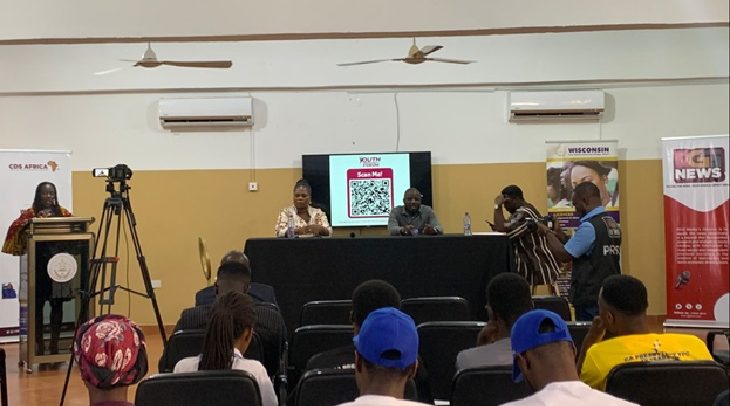
By Katharina PISTOR
The question of whether, and how, democracies should defend themselves against subversion has again become a hot-button issue.
In Germany, a growing chorus is demanding legal proceedings that might result in a ban on the far-right Alternative für Deutschland (AfD).
Already, the Federal Office for the Protection of the Constitution – a domestic intelligence agency – has labeled the party an extremist organization, which implies that it is unconstitutional.
But in Romania’s recent presidential election, voters rejected a far-right nationalist candidate, suggesting that threats to democracy can be thwarted at the ballot box.
And a similar debate preceded the US election last year, when the state of Colorado led an effort to keep Donald Trump off the ballot.
Should a candidate be taken out of the running for breaking the law, or should the electorate always have the final word?
Posing the question this way misses what is truly at stake: the future of constitutional democracy, which is not the same as a people’s democracy.
A constitution sets forth the normative aspirations of the political system it creates, including fundamental civil and political rights.
It determines the scope and limits of power that different branches of government may exercise, including the checks and balances between them.
In contrast, a people’s democracy dispenses with legal constraints, which are seen as obstacles to realizing the true will of the people. Mao Zedong is perhaps the best-known leader of a people’s democracy.
He ruled by fiat, dismantling the legal system and branding landlords, the rich, and various bad influences (including lawyers) as enemies of the people. All were dealt with severely.
Whether this truly reflected the will of the people is anyone’s guess, because Mao simply declared himself to be the people’s only voice.
He also did away with elections; but, of course, when the people are terrorized into submission, they will produce whatever outcome the leader wants, rendering elections meaningless.
Adolf Hitler is another example of a leader who claimed to embody the true will of the people.
He, too, determined who the enemies of the people were (communists, dissidents, Roma, Jews) and had them purged, imprisoned, and killed by the millions. But unlike Mao, he did not entirely dismantle the legal system.
Beneath the Nazi reign of terror was a legal system that had been stripped off its normative foundations but still functioned like a well-oiled machine in ruling on civil, administrative, and even criminal matters.
Nazi Germany, wrote Ernst Fraenkel, was a “dual state”: it administered the lives of ordinary people through law, but “the Leader” ruled without legal restraint.
While Mao came to power by way of revolution, Hitler’s initial attempt to seize power by force led to his imprisonment. But Hitler learned from his mistake and devised plans to gain power by democratic means and then dismantle the system from within.
He turned the National Socialist German Workers’ Party (NSDAP) into a movement that systematically discredited the institutions of the Weimar Republic and made the case for his rise.
The party’s name was well chosen. By including “socialist” and “worker,” it seemed to offer an alternative to the existing pro-workers parties, even though it was actually a radical nationalist organization bent on freeing Germany from the grip of its internal and external enemies (as determined by the infallible Leader).
This time it worked. In 1932, the NSDAP became the largest party in parliament, legitimating the former putschist.
When Hitler was appointed chancellor the following year, he moved quickly to outlaw competing parties and complete his power grab with the infamous Enabling Act (Ermächtigungsgesetz) of March 24, 1933. Henceforth, new laws could deviate from the constitution, and international treaties could be adopted without the participation of the legislature. The rest is history.
Given this context, Germany’s postwar constitution, the Basic Law, was explicitly designed as a “militant constitution” – a term coined by the German jurist Karl Löwenstein, who fled Nazi Germany for the United States. It enshrined the principle that the internal organization of political parties must themselves be constitutional (Article 21): “Parties that, by reason of their aims or the behavior of their adherents, seek to undermine or abolish the free democratic basic order or to endanger the existence of the Federal Republic of Germany shall be unconstitutional.” Thus, proceedings against a party can be initiated by the upper or lower houses of parliament, and by the government, though the Constitutional Court has the final say.
Other countries also have such defensive mechanisms on the books. These include criminal offenses like treason, impeachment procedures against officeholders, emergency powers, and mechanisms for banning political parties.
To some, these might look like a perversion of the very idea of liberal democracy – as a cynical means of eliminating competitors, as Germany’s new chancellor, Friedrich Merz, recently put it.
But the problem with this argument is that you can beat competitors with democratic means only if they themselves adhere to democratic principles.
A sports team that signaled its willingness to break the rules, and which ignored the referee’s calls, would never be awarded the championship, no matter how enthusiastic its fans were.
Rules impose constraints on the players to ensure fair play and a legitimate result. That is as true of constitutional democracy as it is of football.
Katharina Pistor, Professor of Comparative Law at Columbia Law School, is the author of The Code of Capital: How the Law Creates Wealth and Inequality (Princeton University Press, 2019).
The post The case for militant democracy appeared first on The Business & Financial Times.
Read Full Story


















Facebook
Twitter
Pinterest
Instagram
Google+
YouTube
LinkedIn
RSS